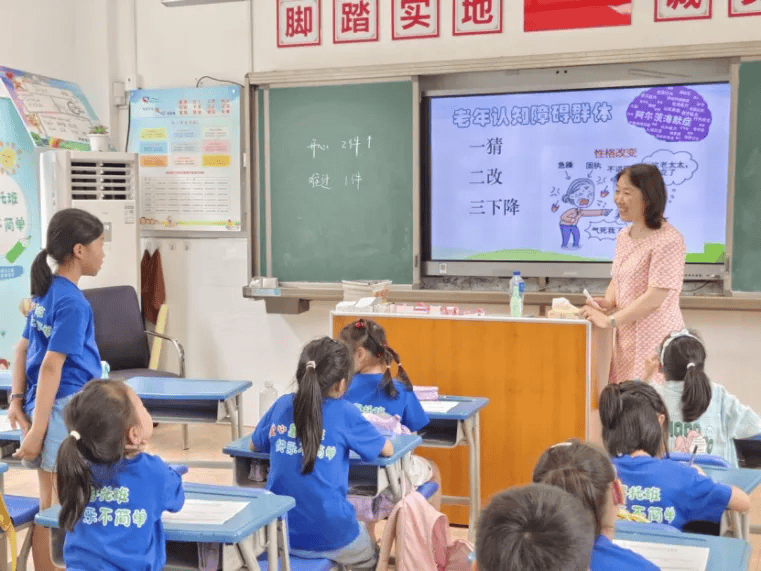Students
“Teacher, can this disease be cured?” A child raised his hand, stood up from his seat, and asked.
Teacher
“No, this disease can only be mitigated through some preventive measures to relieve the symptoms.” The teacher on the platform answered.
This was a scene that occurred during a cognitive impairment publicity and education activity for the elderly held at Songze School in Zhaoxiang Town this summer. Experts from the field of cognitive impairment in the elderly were telling more than 20 children in the summer class about some manifestations and symptoms of Alzheimer’s disease, namely, “first suspicions, then changes, followed by decline, and finally confusion.” “First suspicions refer to elderly people developing suspicions or distrust, changes in behavior and personality are the second point, decline involves a decrease in proactive behavior, self-care abilities, understanding, and judgment abilities, and confusion refers to difficulty in counting, unclear speech, disorientation, and forgetfulness.”
Guided by innocence, focusing on cognitive impairment
In this warm and caring educational activity, the children showed great interest in Alzheimer’s disease, a common disease among the elderly. Their active questioning livened up the classroom atmosphere. The teacher’s words nurtured the children’s minds like gentle rain, teaching them how to better understand and assist the elderly around them, becoming a little sunshine in their later years through companionship.
Joining hands with care, building a support network
In Zhaoxiang Town, a caring support center specifically for cognitive impairment in the elderly has been established within the social work station. This is not only a fixed service point but also a bridge for communication, providing daily guidance and care for the group of elderly people with cognitive impairments. Surrounding supermarkets, banks, convenience stores, and other friendly units collaborate closely with the community, actively participating in providing thoughtful services for the elderly, jointly creating a community atmosphere full of love.
In addition, with professional caregivers and key personnel in the community as the core, Zhaoxiang Town has established a professional volunteer team that is friendly to cognitive impairment. All caregivers are certified, with nearly half of them holding intermediate to advanced certificates; village key personnel emphasize the model of “elderly-led” and “key personnel-led,” constituted by elderly and staff of the same age. As the backbone of the project, volunteers have ingeniously integrated cognitive impairment education and screening into daily services through hard work and selfless dedication, providing training activities and early care for elderly people with cognitive impairments, while offering knowledge and skills support to family members, better helping them understand and cope with cognitive impairment issues in the elderly.
By patiently communicating with the elderly, answering their questions with professional knowledge, every meticulous service provided by caregivers can effectively slow down the process of cognitive decline and improve the quality of life for the elderly; key personnel in the community play a vital role in linking cognitive impaired elderly people to more social resources, guiding various forces to jointly build an elderly-friendly community for cognitive impairment.
The head of the town’s social work station stated that in the future, Zhaoxiang Town will continue to deepen and expand various services for elderly cognitive impairment, strengthen cooperation and communication with various communities, institutions, and social organizations, and awaken memories with love through full societal participation, collectively promoting the construction and development of a community-friendly to cognitive impairment in the elderly.


